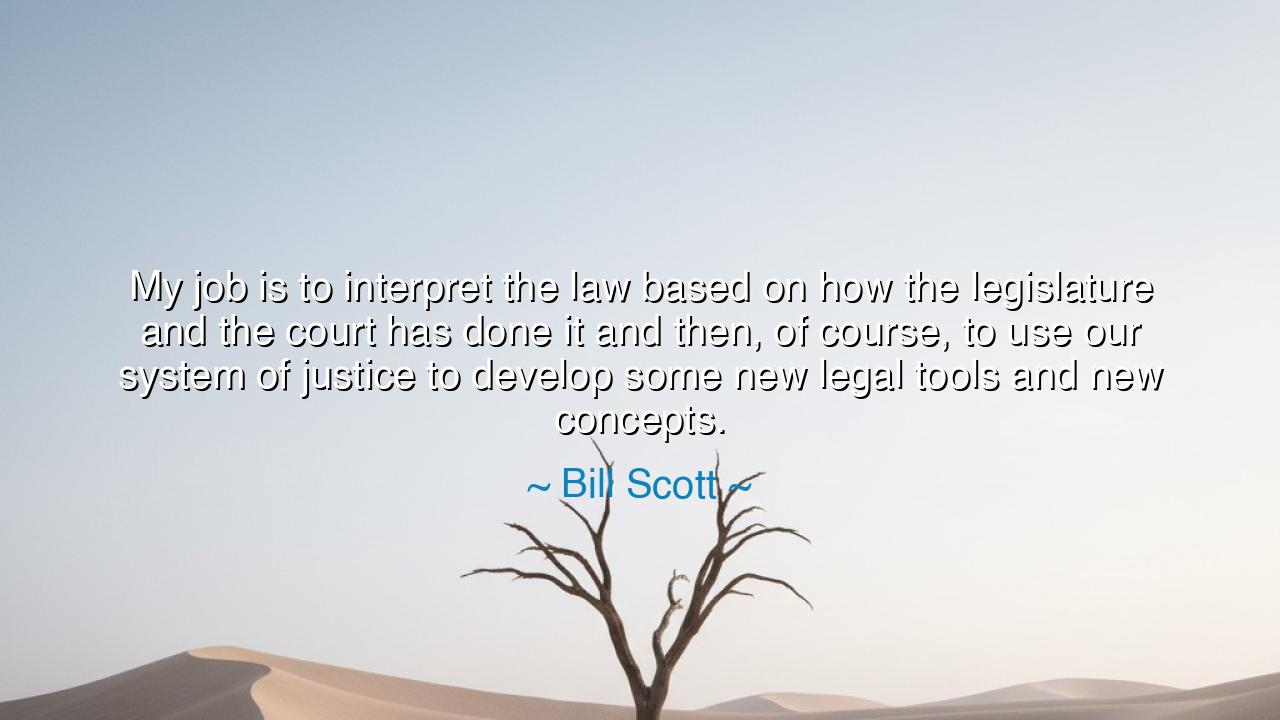
My job is to interpret the law based on how the legislature and
My job is to interpret the law based on how the legislature and the court has done it and then, of course, to use our system of justice to develop some new legal tools and new concepts.






The words of Bill Scott, spoken with the weight of one entrusted with justice, resound like a guide for those who would walk the difficult road of law: “My job is to interpret the law based on how the legislature and the court has done it and then, of course, to use our system of justice to develop some new legal tools and new concepts.” In this single sentence, he captures the eternal balance of the jurist: to honor tradition, yet to shape new pathways; to stand rooted in precedent, yet to stretch forth into innovation. For the law is not a stone unmoved, but a living tree—its roots deep in history, its branches reaching toward the future.
At the heart of his saying lies the humility of interpretation. The task of those who serve justice is not to impose their own will, but to interpret the law faithfully, guided by the wisdom of legislators and the rulings of courts. This is the foundation of order, for without respect for precedent, the law would dissolve into chaos, shifting with the moods of individuals. Scott reminds us that justice must always look backward to what has been written and decided, so that the people may trust that their lives are governed not by whim, but by enduring principle.
Yet his words also carry the spark of innovation. For to merely repeat the past is not enough. New challenges arise, new wrongs emerge, new complexities test the strength of old statutes. Here lies the higher calling: to use the system of justice to craft new legal tools and concepts, so that the law may address realities that those before could not foresee. This is not betrayal of tradition but its continuation, for each generation is charged with adapting eternal principles to present circumstances.
History gives us mighty examples of this truth. Consider the legacy of Chief Justice John Marshall of the United States, who in the early 19th century interpreted the Constitution in ways that strengthened the nation’s unity and established judicial review. He did not abandon the text of the Constitution, but he breathed into it a power and flexibility that allowed it to endure. His work was both interpretation and creation, honoring what had been given while fashioning tools for what was to come. In this, we see the very spirit of Scott’s words made flesh in history.
Scott’s statement also acknowledges the paradox of law: it must be stable yet adaptable. Too rigid, and it becomes brittle, unable to address new injustices. Too fluid, and it loses authority, leaving society without anchor. The wisdom of the jurist lies in knowing how to balance these demands, to preserve the dignity of the law while allowing it to serve the needs of the living. This is the heroic burden of those who take up the mantle of justice.
The lesson is clear: whether in law, leadership, or daily life, one must learn to honor the past while preparing for the future. We must ground ourselves in what has been handed down—whether traditions, values, or wisdom—yet not be so bound by it that we cannot respond to the demands of the present. Just as judges must craft new tools of law, so too must we craft new ways of living faithfully within the principles we inherit.
Therefore, children of tomorrow, take Scott’s words into your heart: respect what has been given, but do not fear to build what is needed. When you face challenges, ask not only, “What was done before?” but also, “What must we create now to remain faithful to justice?” In this way, you will stand in the sacred balance between memory and vision, between duty and creativity. And in that balance lies the enduring strength of human society, ever old, ever new.






AAdministratorAdministrator
Welcome, honored guests. Please leave a comment, we will respond soon